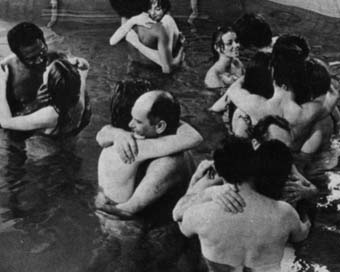The short-lived glory days of nude psychotherapy
Source: io9.com

In 1967, psychologist Paul Bindrim introduced the world to the salubrious properties of naked psychotherapy. Despite the treatment’s somewhat lurid connotations and relative obscurity nowadays, nude psychotherapy did garner its share of press attention, professional consideration, and happy, naked adherents.
Bindrim’s theories were inspired by the famed psychologist Abraham Maslow (you know, the fellow with the hierarchy of needs) and focused on the acceptance of the naked body as a whole. This message wasn’t particularly unorthodox even if his methodology was. Historian Ian Nicholson describes Bindrim’s birthday suit treatments in his eminently readable paper "Baring the soul: Paul Bindrim, Abraham Maslow and ‘Nude psychotherapy":
Nude therapy was based on the idea of the naked body as a metaphor of the "psychological soul." Uninhibited exhibition of the nude body revealed that which was most fundamental, truthful, and real. In the marathon, Bindrim interrogated this metaphor with a singular determination. Bodies were exposed and scrutinized with a science-like rigor. Particular attention was paid to revealing the most private areas of the body and mind-all with a view to freeing the self from its socially imposed constraints. "This," Bindrim asserted gesturing to a participant’s genitalia and anus, "is where it’s at. This is where we are so damned negatively conditioned" [...] Determined to squelch the "exaggerated sense of guilt" in the body, Bindrim devised an exercise called "crotch eyeballing" in which participants were instructed to look at each others genitals and disclose the sexual experiences they felt most guilty about while lying naked in a circle with their legs in the air [...] In this position, Bindrim insisted "you soon realize that the head end and the tail end are indispensable parts of the same person, and that one end is about as good as the other.:"
You can read more about Bindrim’s pants-off therapy sessions at The History of Behavioral Sciences (who are hosting Nicholson’s article) and Mind Hacks.
Article from: io9.com






















